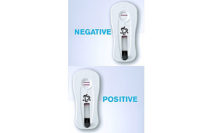Lithium-ion batteries have been used in portable consumer electronics for decades, primarily because they offer excellent energy density, no memory effect and a slow loss of charge when not in use. Because of these benefits, the batteries are also becoming more common in aerospace, military and electric vehicle applications.
Boston-Power Inc. has been manufacturing lithium-ion batteries for nearly a decade. The company has developed batteries for the electronics, transportation, utility energy storage and portable power industries, as well as NASA and several other government organizations. Based in Westborough, MA, the company also operates a technology center in Beijing and manufacturing plants in Taiwan and other parts of Asia.
Boston-Power’s battery technology is based on a combination of chemistry formulations, mechanical engineering and electrical designs at the cell and system levels. The cells have a flat, oval-shaped prismatic design that increases dependability.
Because battery manufacturing is a complex process, Boston-Power emphasizes quality control. It also performs extensive electrical and mechanical testing to ensure product safety.
“A short circuit in a lithium-ion battery can cause it to ignite or explode,” says Declan Shalvey, chief operating officer of Boston-Power. “There are more than 40 features within the electrical assembly of each battery that need to be checked in order to ensure its absolute safety. And these checks have to be done in real time.”
Although simple electrical tests can find major faults inside the battery, latent faults, such as misaligned elements, can be harder to detect. However, these faults can prove just as dangerous should they develop into actual failures by real-world use. Aware of this, Boston-Power recently began using a customized X-Line HRS inline X-ray system to inspect batteries the company makes in Taiwan. 3DX-RAY Ltd. designed, built and delivered the system in eight weeks.
“X-ray scanning is the best and only practical way to see the battery’s internal structure and prevent problems,” says Shalvey. “It provides 100 percent in-line inspection, improves efficiency, and guarantees the manufacturing integrity of every product.”
Boston-Power uses the X-Line HRS to verify the alignment of all internal parts and that the anode and cathode are the proper distance from the
battery wall. The company runs the system 24-7 and inspects up to 600,000 batteries per month.
A stand-alone unit, the X-Line HRS can inspect batteries of different shapes and at various stages of production. It quickly creates, stores and compares high-resolution X-rays, enabling Boston-Power to perform fast and easy “pass-fail” battery inspection. The system also enables 3DX-RAY to change system parameters remotely whenever Boston-Power changes its manufacturing processes.
Batteries can be fed into the system manually, on a conveyor or by a robot. The X-Line HRS can inspect all battery cell types, including alkaline, zinc-carbon, zinc-chloride, lead-acid nickel, hydrogen-oxygen, hydrocarbons, alcohol, air, chlo-rine and chlorine dioxide.
For more information on x-ray inspection systems, call 4401509-817400 or visit www.3dx-ray.com.
X-Ray Inspection Ensures Battery Reliability

Boston-Power Inc. recently began using a customized X-Line HRS inline x-ray system to inspect batteries the company makes in Taiwan. Photo courtesy 3DX-RAY Ltd.

